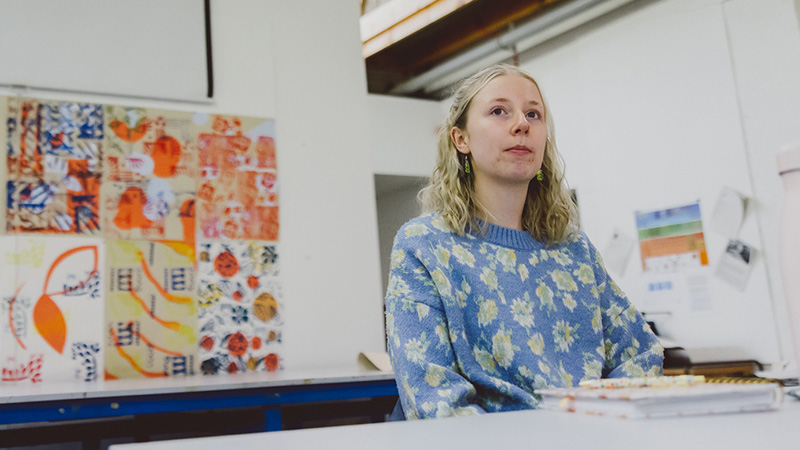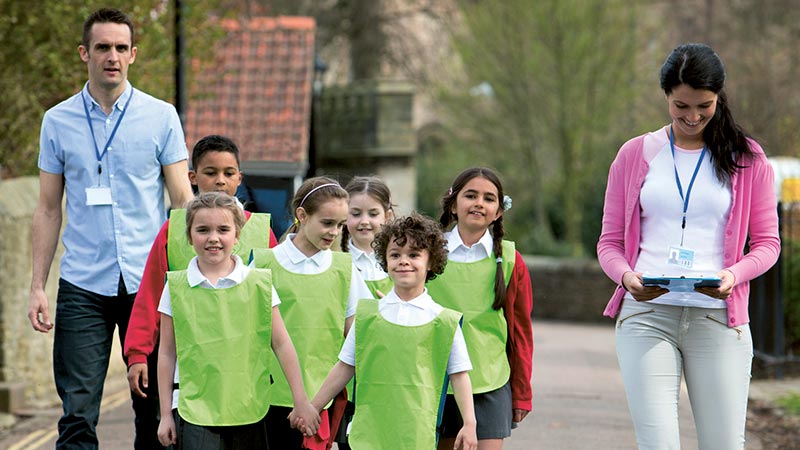Primary Teacher Education (Campus-Based)
BA (Hons)
Key facts
UCAS code
X120
Start dates
September 2024 / September 2025
Location
Course length
Full time: 3 years
Accreditation(s)
The Department for Education
UCAS Tariff Points
104
Overview
The BA (Hons) in Primary Teacher Education is specifically designed to teach trainees how to become effective teachers.
You'll join a course whose graduates inspire thousands of children and lead in hundreds of schools across Oxfordshire and beyond. School leaders know our graduates are well-prepared to meet the high standards expected of them in our schools, with a broad range of on-campus and on-placement teaching and learning preparing them to make a difference in the lives of every child they teach, every day.
University lecturers, who are all highly experienced primary practitioners, will provide excellent support for your academic work, personal development and wellbeing. Teacher mentors will provide advice and guidance whilst you are you’re on placement. The trainees on the course work closely together and develop strong support networks. The wider university network also has a broad range of support for all enrolled students.
You’ll graduate with Qualified Teacher Status.

How to apply
Wherever possible we make our conditional offers using the UCAS Tariff. The combination of A-level grades listed here would be just one way of achieving the UCAS Tariff points for this course.
Standard offer
UCAS Tariff Points: 104
A Level: BCC
IB Points: 29
BTEC: DMM
Contextual offer
UCAS Tariff Points: 88
A Level: CCD
IB Points: 27
BTEC: MMM
Entry requirements
Specific entry requirements
GCSE: GCSEs or equivalents: achieve a standard of grade 4 or higher in English Language, Mathematics and Science (Science with Chemistry, Science with Physics, Science with Biology).
- Additional DBS and Health teaching checks are completed prior to your enrolment. Once you have accepted an offer from Oxford Brookes you will notified to complete your Health and DBS checks preceding your enrolment; you will receive your DBS notification by email in May.
Please also see the University's general entry requirements.
Screening
All applicants will be screened for fitness to practise and a Disclosure and Barring Service (DBS) check will be made.
Selection process
Applicants who meet the entry criteria will be invited to an on-campus interview day. You'll receive an email invite to your on-campus interview, where you’ll find linked interview advice and guidance about what to bring and how to prepare for the day.
The interview day will be at Harcourt Hill campus and will include opportunities to meet current students, tour the campus and learn more about our exciting course.
Enjoy your interview day and ask questions, it’s your chance to find out about us.
English requirements for visas
If you need a student visa to enter the UK you will need to meet the UK Visas and Immigration minimum language requirements as well as the University's requirements. Find out more about English language requirements.
Terms and Conditions of Enrolment
When you accept our offer, you agree to the Terms and Conditions of Enrolment. You should therefore read those conditions before accepting the offer.
Application process
Apply for this course through UCAS.
You will receive a communication from us inviting you to an on campus interview day if your application is successful.
A successful interview will lead to you receiving an offer for a place on this course.
We recommend that you gain some school experience before applying for the course, this is not a requirement for the course.
Tuition fees
Questions about fees?
Contact Student Finance on:
Tuition fees
Please note, tuition fees for Home students may increase in subsequent years both for new and continuing students in line with an inflationary amount determined by government. Oxford Brookes University intends to maintain its fees for new and returning Home students at the maximum permitted level.
Tuition fees for International students may increase in subsequent years both for new and continuing students.
The following factors will be taken into account by the University when it is setting the annual fees: inflationary measures such as the retail price indices, projected increases in University costs, changes in the level of funding received from Government sources, admissions statistics and access considerations including the availability of student support.
How and when to pay
Tuition fee instalments for the semester are due by the Monday of week 1 of each semester. Students are not liable for full fees for that semester if they leave before week 4. If the leaving date is after week 4, full fees for the semester are payable.
- For information on payment methods please see our Make a Payment page.
- For information about refunds please visit our Refund policy page
Additional costs
Please be aware that some courses will involve some additional costs that are not covered by your fees. Specific additional costs for this course are detailed below.
Compulsory costs
| Additional costs | Amount (£) |
|---|---|
| Disclosure Barring Service (DBS) initial check | £54 |
| Physical Education and School Sport (PESS) specialism. Optional kit is available to purchase. | £40-90 |
Travel and associated costs when undertaking work placements. |
£30-700 per year |
Optional costs
| Additional costs | Amount (£) |
|---|---|
| 3-day Outdoor Education Residential in South Wales (inc. food, accommodation, travel, equipment and tuition) | £180 |
| Disclosure Barring Service (DBS) top-up check (to keep up to date) | £13 |
5-day Education Residential to Cornwall (inc. accommodation, travel, equipment and tuition) |
£330 |
It’s your responsibility to cover print / binding costs where coursework submission is required. Please note that a lot of the coursework is now submitted online. |
From £30 |
| You may choose to purchase books to support your studies. Many books on our reading lists are available via the Library, or can be purchased secondhand. | £20-60 per book |
Accommodation fees in Brookes Letting (most do not include bills) |
£94-265 per week |
Accommodation fees in university halls (bills included, excluding laundry costs) |
£122-180 per week |
Graduation costs include tickets, gowning and photography. Gowns are not compulsory but typically students do hire robes, starting at £41. |
Typically £0-200 |
Students are responsible for their own travel to and from university for classes. BrookesBus travel is subsidised for full-time undergraduate students that are on a course with a fee of £9,250 or more, or living in an Oxford Brookes hall of residence. There is an administration fee for the production of a BrookesKey. |
From £10 |
Funding your studies
Financial support and scholarships
Featured funding opportunities available for this course.
All financial support and scholarships
Learning and assessment
At Oxford Brookes we are passionate about excellence for all in education. Discover what this means and how this is delivered across all of our ITE programmes in our curriculum map.
The primary ITE curriculum is based upon the Core Content Framework.
You’ll also spend time on placement every year. You’ll get experience in schools across Key Stages 1 and 2. You’ll undertake a placement where you focus on inclusion. You’ll also be placed in an education venue - like the History of Science Museum or Cotswold Farm Park .

Learning and teaching
You'll learn at our Harcourt Hill Campus where the School of Education is situated. At Harcourt Hill, you'll join a close-knit community of trainee teachers.
You'll also have access to specialist education teaching spaces. You'll explore forest school approaches in our outdoor learning spaces. And you'll be able to borrow teaching resources from our Education Resources Centre. You can choose to live in halls at Harcourt Hill - or apply for a space in any of our other halls across Oxford.
Your learning will comprise of:
The primary ITE curriculum is based upon the core content framework. Link to Core Content Framework
On-campus learning experiences:
- lectures
- seminars
- workshops.
On-placement learning:
- experience in a variety of school settings.
Field trips
During your time on the course, you will have the opportunity to participate in a broad range of additional learning opportunities. Some of these are included in your course fees whilst others incur an additional cost.
Additional opportunities include:
- a 3 day trip to an outdoor education residential centre in Wales (additional charge)
- Aaweek-long residential experience in Cornwall (additional charge)
- Lawn Tennis Association training for teachers
- First Aid training (additional charge).
Please note that we regularly update our offer in order to tailor it to the needs and interests of our trainees.
Assessment
Assessment methods used on this course
On this course you will develop the knowledge, understanding, skills and attributes to become an effective early career teacher (ECT).
You are assessed on this course through a range of course assignments, including:
- essays
- reports
- presentations
- performance on school placements.
There will be opportunities to work collaboratively and independently in order to receive formative feedback. Summative assessments are all graded individually.
Successful completion of the course will result in your receiving a recommendation for Qualified Teacher Status (QTS). You will then be able to take up a post as an Early Career Teacher (ECT) to start your teaching career.
After you graduate
Career prospects
You’ll graduate with skills, knowledge and confidence that you’ll draw on throughout your whole career. You’ll be confident in any classroom, and you’ll have techniques up your sleeve to support every child.
You’ll have built great relationships with your placement schools. And you’ll have specialist skills - like wellbeing, or inclusion - that will set you apart at interview.
You’ll be joining a pool of graduates who have a reputation locally for their creativity, skills and passion. Schools know Oxford Brookes students go the extra mile - because they love teaching. And this makes our graduates sought-after on the employment market.
Professional accreditation
This course is accredited by the Teaching Regulation Agency to grant Qualified Teacher Status (QTS) in the UK. You will be provisionally registered with the Teaching Regulation Agency at the beginning of your course. Students who successfully complete the course will be recommended for QTS.
Please be aware that following the UK's departure from the European Union, QTS awarded by UK higher education institutions is not currently recognised in the EU.
Further study
Early Career Teacher Induction Programme
Oxford Brookes University runs a fully funded and comprehensive Early Career Teacher induction programme in conjunction with Capita.
We also offer a range of master's level courses, such as the MA Education.
Student profiles
Free language courses
Free language courses are available to full-time undergraduate and postgraduate students on many of our courses, and can be taken as a credit on some courses.
Information from Discover Uni
Full-time study
Programme changes:
On rare occasions we may need to make changes to our course programmes after they have been
published on the website. For more information, please visit our
changes to programmes page.
